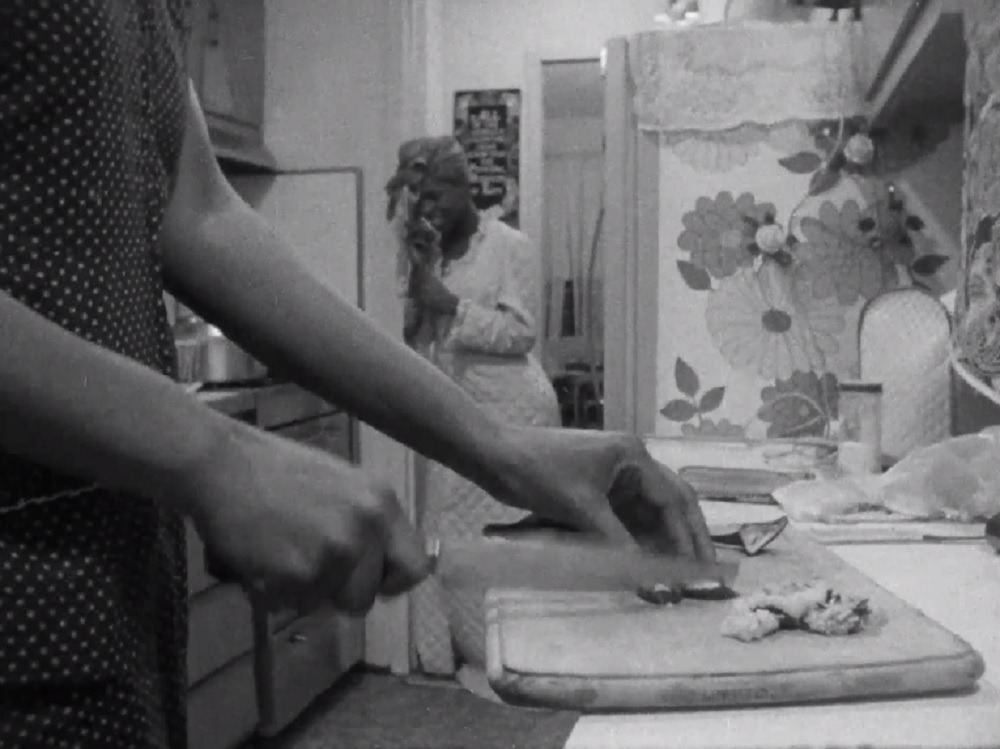“Transmagnifican Dambamuality” (1976), which has the sarcastic subtitle “A Quiet Domestic Drama,” unfolds in an apartment where a family lives. The kitchen is too small to contain the noisy inhabitants, which includes a mother (Genie Massey), daughter (Cheryl Francis) and brother (Darryl Alladice). Meanwhile another brother, Robert (Llewellyn Jones), stays in his room silently alone looking at a photograph of La Vetta, a girl that he has a crush on, which was the director’s sister, who suggested the title. The chaos of the kitchen spills into his reverie, which leads him to join the already crowded and chaotic kitchen. He retreats and listens to music to reclaim his space, which just increases the home’s existing clashes. As his siblings leave dressed up and ready to go out, Robert goes to the living room and creates an atmosphere of soothing peace and calm that shifts the mood of beleaguered coexistence into a loving home.
Ronald K. Gray’s seven-minute student film may have slipped through the cracks if it was not for Gray’s subsequent, uniquely groundbreaking and quiet career. Gray is of note for encouraging his professor, Kathleen Collins, into becoming a filmmaker. This film convinced her to do so, and she asked him to work with her. He was her editor on “The Cruz Brothers and Miss Malloy” (1980) and “Losing Ground” (1982), her only two films, and on the latter, he was also her cinematographer and executive producer. Gray’s real life inspired the storyline and was about his fictionalized observations of his family, i.e. he is not a character in the film. Gray can be equated with the camera.
Gray’s black and white short film uses sound to convey how a house feels less like a refuge and more like a battleground as quotidian sounds transform into the sounds of war. The clash is over resources: space, food, the corded phone. Only the voices of women are heard, and the brothers never speak a word though Robert does utter a sound of frustration. Voices sound like gunfire and fighter aircrafts dive bombing. Only music rehumanizes people and lowers the temperature, but commercial music can still sow discord. It is only creativity and live music that has the power to transform a space into a home and create harmony between people.
This audible metaphor emphasizes how family does not automatically translate into kinship. It also suggests a lack of appreciation for what they have in each other and the potential for their home to be as stately as a concert hall. By going outside, two siblings miss the real show and an opportunity to be together as a family. On the other hand, if the two did not leave, it is possible that Robert would not have the room to create musical magic. Instead, normal sexual maturation becomes a wedge and a point of conflict. The sister’s talk on the phone speaks to her concern of her upcoming date, which leads her to lash out at others in the kitchen. Then the sister makes fun of Robert for simply looking at a girl’s photograph in his room. The siblings acrimonious sparring leads to Robert playing music loudly and taunting his mother when she comes into his room to turn it down. She becomes horrified when she sees a poster on his wall with a sexual situation. Alternatively, no one had to interact with Robert since in the beginning, he was not in the kitchen, bothering any one or making noise. Robert as a sexual being alone in his room, fully clothed and not masturbating, becomes a lightning rod of curiosity for being apart from the group. He also stands out for being contemplative and not wanting to go out.
“Transmagnifican Dambamuality” is easy to overlook considering how short it is and often people dismiss movies from only a few decades ago as old, so a black and white film does not stand a chance. However, it is a piece of cinematic history still innovative, fresh, daring and complete by today’s standards.





